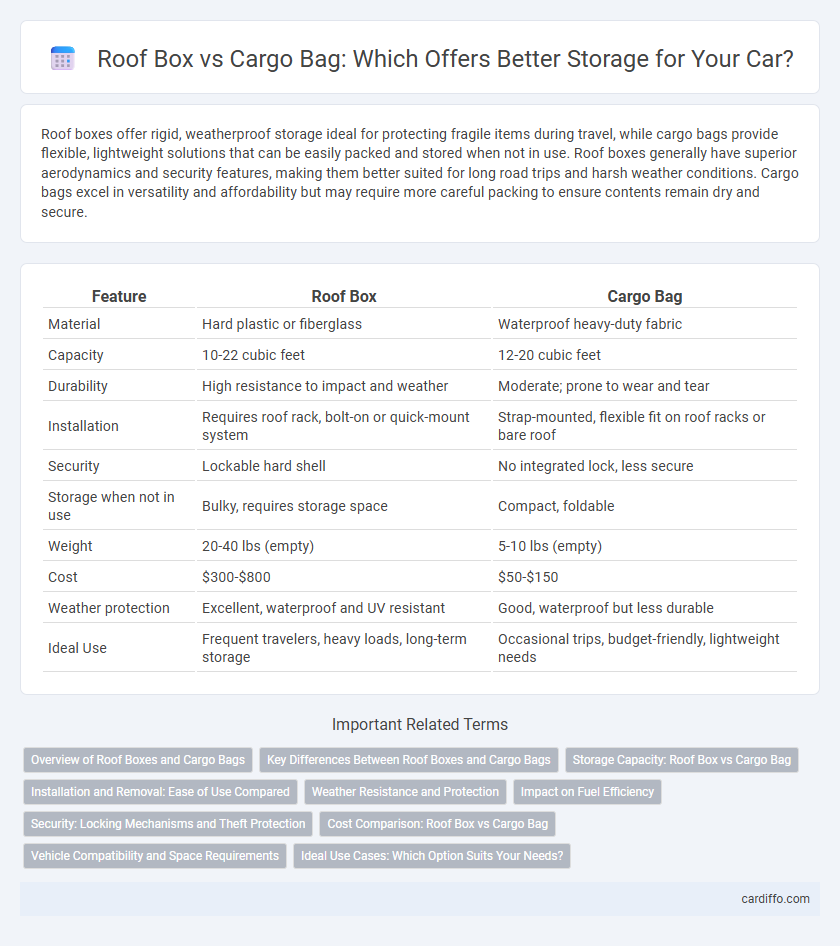Roof boxes offer rigid, weatherproof storage ideal for protecting fragile items during travel, while cargo bags provide flexible, lightweight solutions that can be easily packed and stored when not in use. Roof boxes generally have superior aerodynamics and security features, making them better suited for long road trips and harsh weather conditions. Cargo bags excel in versatility and affordability but may require more careful packing to ensure contents remain dry and secure.
Table of Comparison
| Feature | Roof Box | Cargo Bag |
|---|---|---|
| Material | Hard plastic or fiberglass | Waterproof heavy-duty fabric |
| Capacity | 10-22 cubic feet | 12-20 cubic feet |
| Durability | High resistance to impact and weather | Moderate; prone to wear and tear |
| Installation | Requires roof rack, bolt-on or quick-mount system | Strap-mounted, flexible fit on roof racks or bare roof |
| Security | Lockable hard shell | No integrated lock, less secure |
| Storage when not in use | Bulky, requires storage space | Compact, foldable |
| Weight | 20-40 lbs (empty) | 5-10 lbs (empty) |
| Cost | $300-$800 | $50-$150 |
| Weather protection | Excellent, waterproof and UV resistant | Good, waterproof but less durable |
| Ideal Use | Frequent travelers, heavy loads, long-term storage | Occasional trips, budget-friendly, lightweight needs |
Overview of Roof Boxes and Cargo Bags
Roof boxes provide rigid, weather-resistant storage with aerodynamic designs suited for long trips and heavy loads, enhancing vehicle stability and security. Cargo bags offer flexible, lightweight storage options that easily fold when not in use, ideal for occasional travel and vehicles with less roof clearance. Both solutions maximize roof space utilization, with roof boxes excelling in durability and cargo bags in portability.
Key Differences Between Roof Boxes and Cargo Bags
Roof boxes offer weatherproof, hard-shell protection and typically provide greater security for valuables during travel, whereas cargo bags are made from flexible, water-resistant materials and are easier to store when not in use. Roof boxes generally have higher load capacities and aerodynamically optimized designs to reduce wind resistance and noise, while cargo bags are lighter and more affordable but may require additional securing on roof racks. Choosing between the two depends on factors like durability, protection from elements, ease of installation, and storage needs during off-season periods.
Storage Capacity: Roof Box vs Cargo Bag
Roof boxes typically offer larger storage capacities, ranging from 12 to 22 cubic feet, making them ideal for bulky items and extended trips. Cargo bags provide more flexible storage options with capacities around 8 to 15 cubic feet but may compress or deform under heavy loads. Choosing between a roof box and cargo bag depends on balancing maximum storage needs with ease of installation and vehicle aerodynamics.
Installation and Removal: Ease of Use Compared
Roof boxes offer quick installation and removal with secure mounting systems that typically involve clamps or quick-release mechanisms, ensuring stability and ease for repeated use. Cargo bags require less rigid mounting but often need straps or tie-downs that may take more time to secure properly and can be less stable in high winds. The durability of roof boxes makes them ideal for frequent long-term use, while cargo bags suit occasional trips with simpler storage needs.
Weather Resistance and Protection
Roof boxes provide superior weather resistance and protection due to their rigid, hard-shell construction, which shields contents from rain, snow, and debris effectively. Cargo bags, typically made from waterproof fabrics, offer decent protection but are more susceptible to punctures and water seepage under heavy or prolonged exposure. For long-term storage and harsh weather conditions, roof boxes are the more reliable option to keep gear safe and dry.
Impact on Fuel Efficiency
Roof boxes typically increase aerodynamic drag more than cargo bags, leading to a notable reduction in fuel efficiency, often by 5-15% depending on size and shape. Cargo bags, being more flexible and streamlined, create less wind resistance and may cause only a minimal decrease in miles per gallon. Choosing a lightweight, low-profile storage solution minimizes the negative impact on fuel consumption during travel.
Security: Locking Mechanisms and Theft Protection
Roof boxes provide superior security with integrated locking mechanisms made from hardened steel, deterring theft effectively compared to cargo bags, which typically rely on simple zipper locks that are easier to breach. Advanced roof box models often feature reinforced hinges and tamper-resistant fasteners, enhancing protection during travel and long-term storage. Cargo bags, while lightweight and flexible, lack the rigid structure and robust locking systems necessary to safeguard belongings against theft in high-risk environments.
Cost Comparison: Roof Box vs Cargo Bag
Roof boxes typically cost between $300 and $700, offering durable, weather-resistant storage solutions that last for years, while cargo bags range from $50 to $150, providing a budget-friendly, flexible alternative. The initial investment for a roof box is higher, but it often justifies itself through enhanced security and aerodynamics, reducing fuel costs over time. Cargo bags, although cheaper upfront, may require replacement more frequently due to wear and tear and lack of rigid protection.
Vehicle Compatibility and Space Requirements
Roof boxes offer a rigid structure ideal for vehicles with factory-installed roof racks, providing organized storage without affecting aerodynamics significantly. Cargo bags are flexible, easily adjusted for different vehicle roof sizes, but may require additional securing to prevent shifting during travel. Both options require assessing roof load limits and available space to ensure safe and efficient use with various vehicle models.
Ideal Use Cases: Which Option Suits Your Needs?
Roof boxes provide secure, weatherproof storage ideal for long road trips, family vacations, and carrying fragile items, offering superior protection and aerodynamics. Cargo bags offer flexibility and affordability for occasional use, lighter gear, and irregularly shaped items, perfect for weekend getaways and seasonal outdoor activities. Choosing between a roof box and cargo bag depends on frequency of use, cargo type, vehicle compatibility, and budget considerations.
roof box vs cargo bag Infographic

 cardiffo.com
cardiffo.com